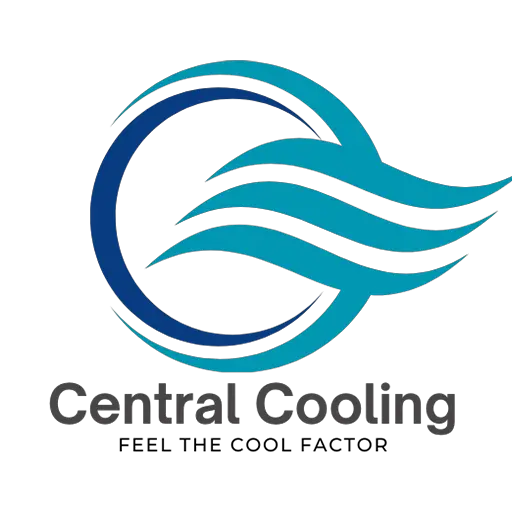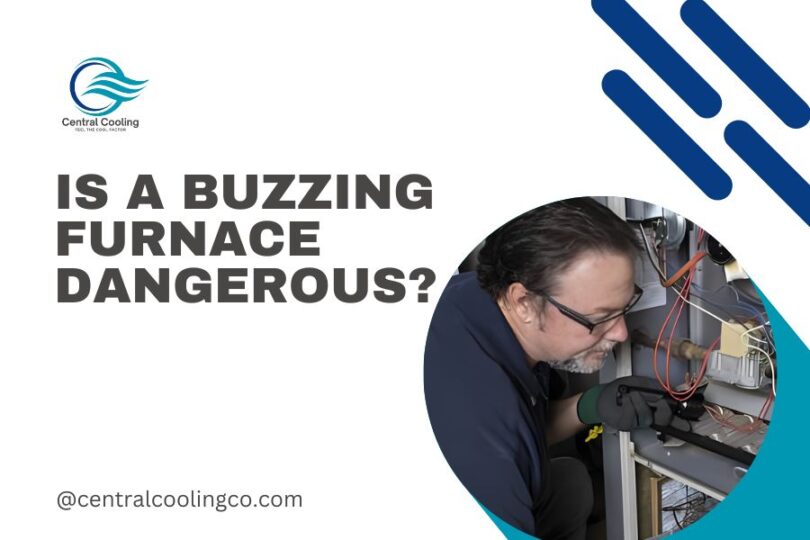Key Take Away:
A buzzing furnace can be concerning, potentially indicating underlying issues with your heating system. Causes include loose components, faulty fan motors, electrical problems, clogged air filters, ignition issues, and ductwork problems. Potential dangers include gas leaks, mechanical malfunctions, fire hazards, and carbon monoxide poisoning. Immediate attention is needed for intense buzzing, burning smells, repeated cycling, or inconsistent heating. Prevention involves regular maintenance, changing air filters, keeping the furnace area clear, and monitoring carbon monoxide levels. If issues arise, investigate the source, contact a qualified HVAC technician promptly, and follow their recommendations. While not always dangerous, addressing buzzing sounds promptly is crucial to prevent reduced efficiency, system failure, and potential safety hazards. Regular maintenance, prompt repairs, and awareness of warning signs are key to ensuring a furnace’s safe and efficient operation. Consulting a professional HVAC technician for proper diagnosis and resolution is advised for any concerns.
Introduction:
Furnaces are crucial to the home heating system in keeping us warm and comfortable during the colder months. However, it’s not uncommon for furnaces to emit strange noises, such as buzzing sounds. This raises the question: Is a buzzing furnace dangerous? In this blog post, we will explore the possible causes of a buzzing furnace and determine whether it poses any safety risks.
Possible Causes Of A Buzzing Furnace:
A buzzing furnace can cause concern, as it may indicate an underlying problem with your heating system. While not all buzzing sounds are dangerous, it is important to identify the cause and address it promptly to ensure the safety and efficiency of your furnace. Here are some possible causes of a buzzing furnace:
Loose Components:
One common cause of a furnace buzzing noise is loose components. Over time, the vibrations from the furnace’s operation can cause screws, bolts, or other parts to become loose. This can result in a buzzing or rattling sound. While this may not pose an immediate danger, it is advisable to have a professional technician inspect and tighten any loose components to prevent further damage or potential hazards.
Faulty Fan Motor:
A defective fan motor can also cause your furnace to buzz. The fan motor is in charge of circulating warm air throughout your home. A buzzing sound may be produced if the motor malfunctions or wears out. In addition to the noise, a faulty fan motor can lead to reduced airflow, decreased heating efficiency, and even overheating of the furnace. It is crucial to have a qualified HVAC technician diagnose and repair any issues with the fan motor to avoid further damage and ensure the proper functioning of your furnace.
Electrical Issues:
Electrical issues can contribute to a buzzing furnace. Loose wiring, damaged electrical components, or a faulty transformer can all cause buzzing sounds. Electrical issues should never be overlooked because they can offer major safety threats, such as electrical fires or furnace damage. If you suspect an electrical issue, it is essential to contact a licensed electrician or HVAC technician to assess and resolve the problem.
Clogged Air Filter:
A clogged air filter can cause problems in your furnace, including a buzzing noise. The furnace has to work harder and may shake or make strange noises when the air filter is dirty or blocked because it inhibits airflow. Maintaining the efficiency of your furnace and preventing this problem can be achieved by routinely cleaning or replacing the air filter.
Ignition Issues:
If your furnace uses gas for heating, a buzzing noise could indicate ignition issues. A faulty ignition system or a problem with the gas valve can result in a buzzing sound during the ignition process. Ignition issues should be addressed promptly to prevent gas leaks or other safety hazards. It is recommended to have a professional HVAC technician inspect and repair any problems related to the ignition system.
Ductwork Problems:
Problems with the ductwork can also contribute to a buzzing furnace. Loose or damaged ducts can create vibrations or airflow restrictions, leading to buzzing sounds. In addition to the noise, ductwork issues can cause uneven heating, reduced energy efficiency, and increased utility bills. To guarantee maximum heating system efficiency, it is recommended to have a professional HVAC specialist evaluate and repair any ducting issues.
Potential Dangers of A Buzzing Furnace:
Gas Leaks:
One of the most alarming potential dangers associated with a buzzing furnace is the possibility of a gas leak. Since many furnaces operate on natural gas, a buzzing sound might indicate a problem with the gas line. Gas leaks are extremely hazardous, as they can lead to explosions or, even more insidiously, carbon monoxide poisoning. If there’s any suspicion of a gas leak, immediate action is crucial: evacuate the premises immediately and contact both your gas supplier and a licensed HVAC specialist to conduct a thorough inspection and resolve the issue.
Mechanical Malfunctions:
Another significant concern related to a buzzing furnace is mechanical malfunctions within the system. The buzzing sound may be indicative of worn-out or damaged components such as the fan or blower motor. While these malfunctions may start as minor annoyances, they can escalate quickly, affecting the furnace’s performance, increasing the risk of overheating, or even leading to complete system failure. Addressing mechanical issues promptly through inspection and repair by a trained professional is essential to prevent further damage and ensure the safe operation of your furnace.
Fire Hazards:
If left unaddressed, a buzzing furnace can become a fire hazard. Electrical issues, gas leaks, or overheating caused by mechanical malfunctions can increase the risk of a fire breaking out. Maintaining your house and family throughout fire season requires timely repairs and routine maintenance to reduce the likelihood of a fire.
Carbon Monoxide Poisoning:
A buzzing furnace may also indicate a problem with the combustion process, potentially leading to the release of carbon monoxide gas. Carbon monoxide is colorless, odorless, and deadly when inhaled in large quantities. Symptoms of carbon monoxide poisoning include headaches, nausea, dizziness, and confusion. If you suspect your furnace is leaking carbon monoxide due to a buzzing sound or experience any associated symptoms, evacuate your home immediately and contact emergency services. Installing carbon monoxide detectors near your furnace and regularly checking their batteries can provide early detection and potentially life-saving warnings in the event of a leak.
When To Be Concerned About Buzzing Furnace:
While a buzzing furnace may not always indicate a dangerous situation, certain signs should prompt immediate attention:
- Intense Buzzing: If the buzzing sound is particularly loud or intense, it could be a sign of a serious issue. This could include a malfunctioning motor or a major electrical problem. In such cases, turning off the furnace and contacting a professional technician is advisable.
- Burning Smell: If you notice a burning smell and a buzzing noise, it is crucial to take immediate action. This could indicate a potential fire hazard and should not be ignored.
- Repeated Cycling: If your furnace frequently turns on and off, accompanied by a buzzing sound, it could indicate an underlying problem. This constant cycling can strain the system and lead to further damage if not addressed.
- Inconsistent Heating: If your furnace is producing a buzzing sound and you notice inconsistent heating throughout your home, it could
Preventing Furnace Issues:
Prevention is always better than cure when it comes to furnace issues. Taking some proactive measures can reduce the likelihood of encountering problems with your heating system. Here are some tips to help you prevent furnace issues:
- Regular maintenance: Schedule annual maintenance for your furnace with a qualified HVAC technician. They will inspect and clean your furnace, ensuring it is in optimal condition.
- Change air filters: Regularly replace the air filters in your furnace to prevent dust and debris from clogging the system. Clogged filters can lead to reduced efficiency and potential damage to the furnace.
- Keep the area around the furnace clear: Avoid storing flammable items near your furnace to reduce the risk of fire hazards. Additionally, ensure enough space around the furnace for proper ventilation.
- Monitor carbon monoxide levels: Install carbon monoxide detectors near your furnace and regularly check their batteries to ensure they function properly. Carbon monoxide leaks can be extremely dangerous, so it’s important to have early detection.
Addressing Furnace Issues:
If you notice a buzzing noise or any other issues with your furnace, it is important to address them promptly. Ignoring furnace problems can lead to further damage and potential safety hazards. Here are some steps to take when addressing furnace issues:
- Investigate the source of the buzzing noise: Try to locate the origin of the buzzing sound. It could be a loose component, a faulty motor, or an electrical issue. If you are unsure, it is best to contact a professional.
- Contact a qualified HVAC technician: If you cannot resolve the issue on your own or if other concerning symptoms accompany the buzzing noise, it is recommended to contact a professional HVAC technician. They have the expertise to diagnose and repair furnace problems safely.
- Follow the technician’s recommendations: Once the HVAC technician has assessed the issue, they will provide recommendations for repair or replacement if necessary. It is important to follow their advice to ensure the proper functioning of your furnace.
Frequently Asked Question:
Is A Buzzing Furnace Always A Cause For Concern?
Not always, but it can indicate issues like loose components, faulty wiring, or mechanical problems that may lead to safety hazards.
How important Is It To Address Buzzing Sounds Promptly?
Prompt attention is crucial, as neglecting buzzing noises can lead to reduced efficiency, system failure, and even fire hazards.
What Should I Do If I Hear A Buzzing Sound From My Furnace?
Conduct visual inspections for loose parts, check the thermostat settings, and clean or replace air filters. If issues persist, seek a professional inspection.
Conclusion:
While a buzzing furnace may not always indicate a dangerous situation, it’s essential to recognize the potential risks associated with this symptom. Prompt attention to buzzing sounds, along with other warning signs, is crucial to prevent reduced efficiency, system failure, and potential safety hazards. Regular maintenance, timely repairs, and awareness of warning signs are key to ensuring the safe and efficient operation of your furnace. Consulting a professional HVAC technician for proper diagnosis and resolution of any concerns is advised to maintain the comfort and safety of your home throughout the heating season.
Disclosure: We may get commissions for purchases made through links in this post.








